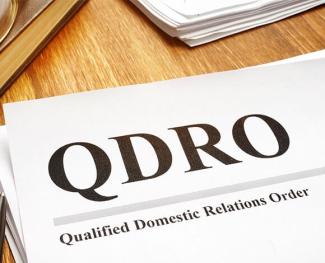
Qualified Domestic Relations Order: How it is Used in a Divorce
When it comes to divorce, there are many financial decisions that must be made throughout the process. Estate plans, tax issues, and division of assets are common issues that can quickly complicate matters.
Specifically, retirement assets (IRAs, 401(k)s, 403(b)s, etc.) require some administrative hurdles to address before agreeing on a division of assets. In most cases, a spouse with a retirement plan cannot directly give the other spouse a share of the plan. This is where Qualified Domestic Relations Order (QDRO) comes into the picture.
What is a QDRO?
A QDRO is a court-ordered judgment or decree for a retirement plan to either pay child support, alimony or marital property rights to a spouse or child/dependent. All retirement plans normally provide guidelines and may even offer standardized paperwork to setup a QDRO. However, because these forms typically follow a cookie-cutter approach, it may not be as applicable to what spouses are trying to accomplish as part of the divorce proceedings. Consulting with an attorney to draft a QDRO is usually the best path to take.
Types of QDRO Distributions
As part of the QDRO, there are a few options in how the portion of the account can be distributed.
- Lump-Sum: This may be the simplest option though one has to keep in mind that ordinary income taxes must be paid on the distribution. If the recipient of the lump-sum distribution is a child or dependent of the retirement account owner, then the owner is taxed instead. A potential alternative to a lump-sum may be to annuitize it, thus allowing you to spread out the tax burden.
- Leaving it where it is: One option is to leave the funds within the plan but still retaining the ability to invest or manage your portion. This can get administratively complicated, and caution must be taken to ensure that the QDRO is drafted properly to address this option.
- Rolling it over: This tends to be the go-to option for many spouses as rolling over the assets to an IRA would retain its tax-deferred status as well as having complete control.
Conclusion
Divorce is already a complicated, emotional process. Ensuring that everything goes smoothly should be a priority when discussing asset division. QDROs are one of the tools that can make this significantly easier. Consulting with an attorney is strongly recommended. Additionally, a fee-only financial advisor can help you throughout this process.
Weingarten Associates is an independent, fee-only Registered Investment Advisor in Lawrenceville, New Jersey serving Princeton, NJ as well as the Greater Mercer County/Bucks County region. We make a difference in the lives of our clients by providing them with exceptional financial planning, investment management, and tax advice.

